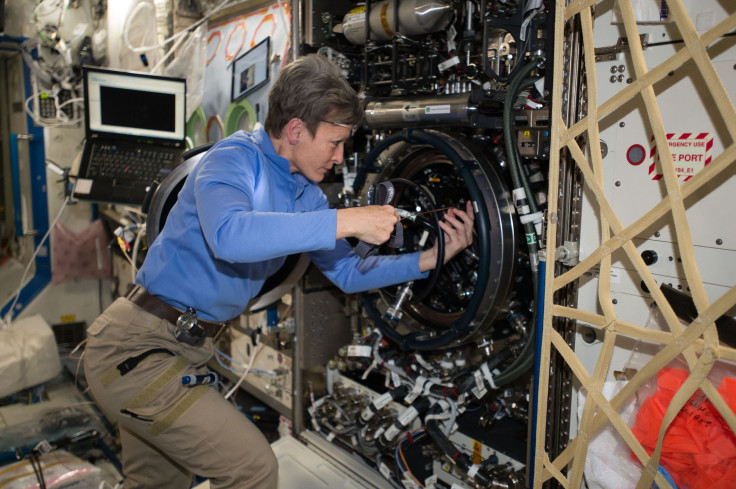NASA Astronaut Peggy Whitson Breaks US Record For Most Number Of Days In Space, To Get Call From Trump

At 1:27 a.m. EDT Monday, U.S. astronaut Peggy Whitson — who, in November, became the oldest woman to fly in space — broke the record for the most cumulative days spent in space by an American. Whitson, who is also the first woman to command the International Space Station (ISS) and the only one to command it twice, surpassed Jeff Williams’ record of 534 days.
At 1:27 a.m. ET on April 24, @AstroPeggy has officially broken @Astro_Jeff's record of 534 days in space. Wish her well with #CongratsPeggy! pic.twitter.com/ylZtOwt4lA
— International Space Station (@Space_Station) April 24, 2017
U.S. President Donald Trump, first daughter Ivanka Trump, and NASA astronaut Kate Rubins will make an Earth-to-space call at 10:00 a.m. EDT Monday to congratulate Whitson. The call can be watched live here, or via the video embedded below.
“I love being up here,” Whitson, 57, said in a statement early last month, after her stay on board the ISS was extended by three months. “Living and working aboard the space station is where I feel like I make the greatest contribution, so I am constantly trying to squeeze every drop out of my time here.”
It is one of those rides that you hope never ends. I am so grateful for all those who helped me on each of my missions! #LifeInSpace pic.twitter.com/msjKSg6WWH
— Peggy Whitson (@AstroPeggy) April 23, 2017
Whitson’s latest stint in space began Nov. 19, when a Soyuz capsule carrying her and two other astronauts — from Russia and France — docked with the ISS. Last month, when she took over from NASA astronaut Robert Shane Kimbrough, she became the first woman to command the space station twice. Whitson, who made her eighth spacewalk in March, also holds the record for most spacewalks by a female astronaut.
In April, NASA and Russian space agency Roscosmos announced they had signed an agreement to extend Whitson’s stay on the space station into Expedition 52. Instead of returning to Earth with her Expedition 51 crew members Oleg Novitsky of Roscosmos and Thomas Pesquet of the European Space Agency in June as originally planned, Whitson will return home with NASA’s Jack Fischer and Roscosmos’ Fyodor Yurchikhin in September.
By then, she would have spent 666 days in space — much higher than Williams’ 534 days but still far from the global record of 879 days set by Russian cosmonaut Gennady Padalka in 2015.
“I'm not here because of the record,” Whitson told ABC News via video teleconference earlier this month. “I'm definitely here for conducting the science.”
© Copyright IBTimes 2025. All rights reserved.






















